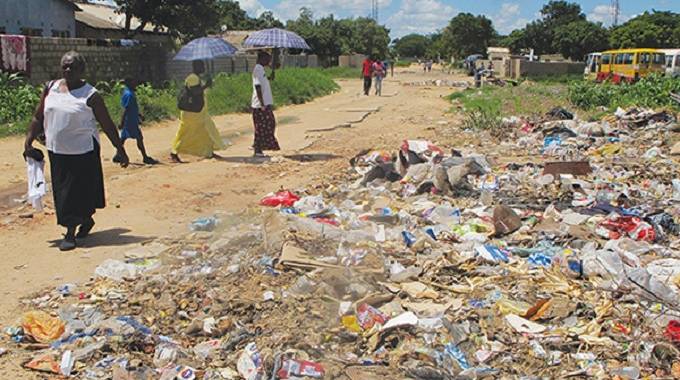EDITORIAL COMMENT: Councils must act fast to stem disease outbreaks

The country is battling cholera and typhoid outbreaks that, by mid-morning yesterday, had killed at least 33 people since June.
The first cholera cases were reported in Harare on September 1 and 20 people have died of the disease, whereas typhoid was reported in Gweru in June and 13 people had succumbed to it by Monday.
Information from the Ministry of Health and Child Care shows that the outbreaks have spread from Harare and Midlands provinces to Manicaland, Masvingo and Mashonaland Central. There is the obvious threat that more could be hit as well. More than 2 300 suspected cholera cases had been handled. With regard to typhoid, 1 943 suspected cases had been recorded by Friday last week, 16 confirmed.
That we have yet another cholera challenge in Harare is sadly, not surprising. Harare City Council has totally failed to supply safe water to residents over the past decade or so. Water and sewer pipes burst frequently and take long to be fixed, particularly in high-density areas. Also, the council’s water pumping capacity is low versus rising demand in the city of at least 1, 5 million.
As a result, most suburbs go for months without safe and reliable water supplies. In the few suburbs that get it, water with faecal matter flows out of taps. To go round the challenge people in Harare and Chitungwiza buy bottled water for consumption. They are also digging shallow wells and sinking boreholes in their yards to supply their households with the precious liquid.
The typhoid outbreak in Gweru came as a bit of a surprise but the local authority has also struggled to provide safe water at all times. It started after a water outage in most areas of the city caused by multiple pipe bursts from the local treatment works. Like Harare and other towns and cities, Gweru has an army of food vendors who operate in unsanitary conditions and whose awareness to the dangers of both diseases is poor. Both cities collect rubbish infrequently.
These are favourable conditions for cholera and typhoid to occur.
The Government, working with both councils, has responded by providing water treatment chemicals at household level, establishing emergency treatment facilities as well as launching educational campaigns to educate residents on the importance of personal and household hygiene and the need for them to seek medical attention as soon as they suspect that they have symptoms of the diseases.
Cholera causes watery diarrhoea, extreme loss of fluid and electrolytes, and severe dehydration. It progresses very fast so can kill a person within two hours of manifestation. Vomiting, leg cramps, skin loss, sunken eyes, dry mouth, decreased secretion, fast heart beat, low blood pressure, dizziness or light-headedness and rapid weight loss are the other symptoms.
The two major symptoms typhoid — fever and skin rash — normally begin between 6 and 30 days after exposure to the bacteria. Others include weakness, abdominal pain, constipation and headaches. Some patients can experience confusion, diarrhoea and vomiting.
Yesterday, the Government scaled up the response by declaring the Harare cholera outbreak an emergency.
Speaking after visiting Beatrice Road Infectious Diseases Hospital, one of the treatment camps in Harare, Health and Child Care Minister Dr Obadiah Moyo said declaring the outbreak an emergency allowed the State to quickly mobilise resources to contain the disease.
“We are declaring an emergency for Harare. This will enable us to contain cholera and typhoid in the city as quickly as possible. We do not want further deaths, so if we do not create this disaster emergency situation, we will continue losing lives,” he said.
He castigated Harare City Council for failing to attend to sewer bursts in Glen View, resulting in contamination of boreholes.
“Someone slept on duty and this is one of the problems we must tackle as Zimbabwe. People must work. This whole problem is a result of blocked sewers and these were reported but were never repaired for at least two months. Now we have the whole of Glen View and Budiriro being affected,” he said.
The decision that the Government has taken is critical for, as the minister says, it enables authorities to marshal more resources in emergency fashion to deal with the disease. Assistance can also be sought from development partners.
The typhoid situation in Gweru must be monitored closely with a view to scaling up the response if cases continue to rise.
For both diseases to be curbed, our people are encouraged to practise greater personal and household hygiene. They must avoid open defaecation and urination, always wash their hands with running water and soap before they eat, prepare or serve food, wash fruits and vegetables before cooking or eating them. It is advisable for them to always boil water before they drink it.
But on their own, households cannot defeat the diseases as long as their environments are not supportive enough. Councils must therefore work harder to be able to collect rubbish more regularly and supply potable water to residents all the time. Whenever water or sewer pipes burst, they must be fixed immediately and effectively. On this point, we are mindful of the fact that the pipes are always bursting because the water and sewer reticulation systems in most towns and cities are not only old but also too small to serve the fast growing urban population.
Therefore, the most effective solution is for local authorities, with support from the Government, to rebuild and re-design their infrastructure. Decongesting certain suburbs by expanding housing delivery can be helpful too.









Comments